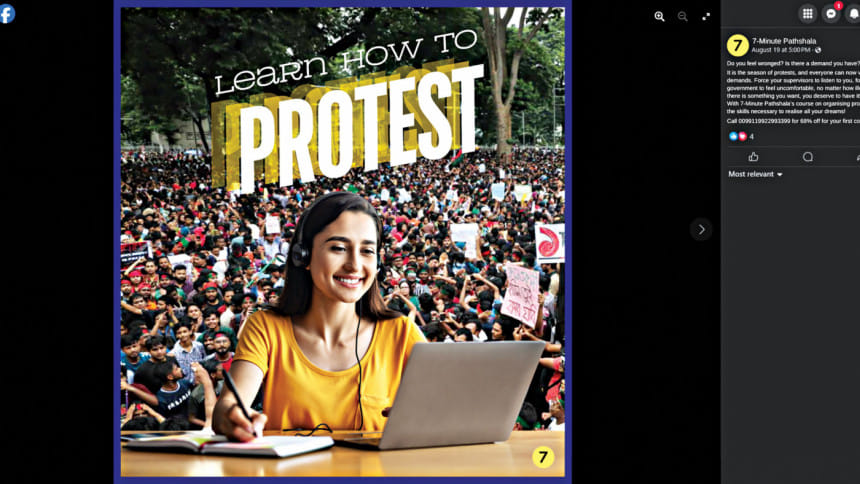EdTech platforms offer courses on protests and marching

In a move that has left both educators and politicians scratching their heads, EdTech platform 7-Minute Pathshala has launched a new course on organising protests and marches. The course, launched by Bebshachandra Biddapukur, a business graduate turned EdTech mogul, promises to revolutionise the way citizens engage in democratic demonstrations.
Biddapukur, known for his previous ventures into short-term educational content, claims that his new course will offer "quick and effective" strategies for organising protests.
"In just seven minutes, students will learn everything they need to know about rallying support, planning routes, and crafting the perfect slogan," said Biddapukur. "After all, who has time for long lectures when there's a government to topple?"
The course comes at an ironic time for Bangladesh, where protests have been frequent and intense since the government was recently ousted, causing chaos and confusion throughout the country. Critics argue that Biddapukur's timing might be a tad too opportunistic, but the platform's supporters believe it's a necessary innovation.
Biddapukur is not alone in this new educational endeavour.
Competitor Laser, a platform known for its "intense and immersive" 5-minute modules, has also jumped on the bandwagon. Laser's latest offering, "Protest Planning in a Pinch", promises to teach users how to stage effective demonstrations in a format even more condensed than 7MP's.
"We believe in efficiency," said Laser's founder Olposhikkha Ohonkari, yet another business graduate.
"Why spend 7 minutes when you can do it in 5?" he asked, winking.
Meanwhile, Shikhbi na, mane? (which translates to "What do you mean you won't learn?") has introduced their own course titled "Protest 101: The Essentials". This course prides itself on its no-nonsense approach, focusing on the bare basics of protest organisation and emphasising "learning by doing".
"We've cut out the fluff," said their founder Pikachu Electra, "and provide actionable strategies that you can apply immediately. Perfect for when your country is in turmoil and you're fresh out of ideas."
Despite the proliferation of protest-focused courses, not everyone is convinced of their value.
"It's a troubling trend," said Dr Jawaharlal Jinnah, a political science professor. "While these platforms might be tapping into current events, they're reducing complex social movements to mere checklists. Protests are about much more than efficient planning -- they're deeply rooted in societal issues that these courses overlook, and they're also about going viral on Facebook."
In response to the criticism, Bebshachandra Biddapukur defended his course, arguing that it was not meant to replace in-depth political education but to offer practical, immediate solutions for a highly volatile situation.
""We're just responding to market demands. Our course doesn't pretend to solve all the problems," he said. "It just helps people get out there and make their voices heard quickly. We even have a vibrant digital marketing course to help young budding politicians, and everyone knows how useful those are. We want to help create a whole new category of politicians who are entrepreneurs. Politipreneurs, if you will."
As Bangladesh navigates its political upheaval, the surge in protest-oriented EdTech courses underscores a curious convergence of technology and activism. Whether these short-form educational tools will genuinely impact the country's tumultuous landscape remains to be seen, but for now, they provide a snapshot of how modern technology intersects with age-old struggles for democratic change, and how some people will do anything to sell a course.

 For all latest news, follow The Daily Star's Google News channel.
For all latest news, follow The Daily Star's Google News channel. 



Comments